Anyone who has ever organized an event knows just how much work that can be.
They’ve likely also felt the sense of relief that occurs when you find a tool that can take over some repetitive, annoying aspect of the job, be it registering attendees or handling data analytics.
This feeling can cause some event organizers’ tech stacks to grow rather quickly, and for good reason.
Event technology is any software or hardware that is used to plan, manage, or enhance an event.
Tools range from event registration and management software, marketing tools, and event apps to VR headsets and lighting fixtures.
Businesses leveraging event tech experience reductions in costs, saved time, happier attendees, and plenty of other benefits that we’ll explain in detail throughout this article.
- Saves Your Time
- Enables Pre-Event Interaction
- Increases Audience Engagement
- Makes the Day of the Event Stress-Free
- Provides Valuable Data
- Enables Post-Event Success
- Conclusion
Saves Your Time
Event organizers rarely feel that there is enough time in the day to do all their work. Venue negotiations, event strategy sessions, and numerous administrative tasks eat up their time.
It’s no wonder why so many event planners reach the end of the day and still have a checklist filled with uncompleted core objectives.
Fortunately, event technology can lighten the workload and give you some of your time back at various points throughout the event planning process.
The registration step in particular is one of the most time-consuming parts of event planning.
With the right event registration software, you can use templates and automations to quickly and easily set up an event page and an online registration form customized to your specific needs.
Many tools, like Regpack below, feature a drag and drop interface for building these forms:
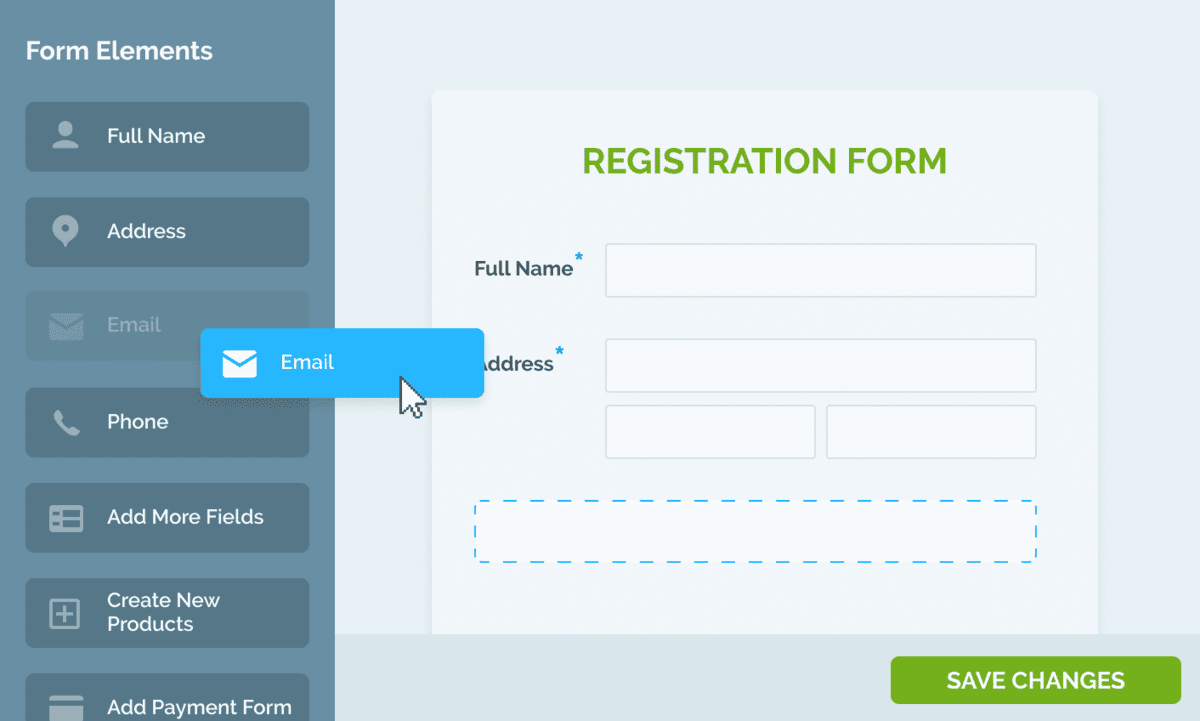
Source: Regpack
These online registration forms can save your team hours a day, as they replace manual methods for registering attendees, like phone or mail, which require a staff member’s involvement, especially in the tedious task of transferring data from the form to your online database.
With registration forms placed strategically across your site, prospective attendees sign themselves up, no human needed.
And via integrations between your systems and the registration software, the data they input will immediately transfer into the systems that use this attendee data, such as your CRM or marketing automation tool.
Event technology also automates other processes which would otherwise take a lot of time and effort, one of them being data analysis.
The software gives you real-time analytics to track your key event metrics, while also enabling you to quickly build reports to spot trends or insights that can help you make decisions and improve your event.
For example, users can quickly build out graphic-filled dashboards like this one:
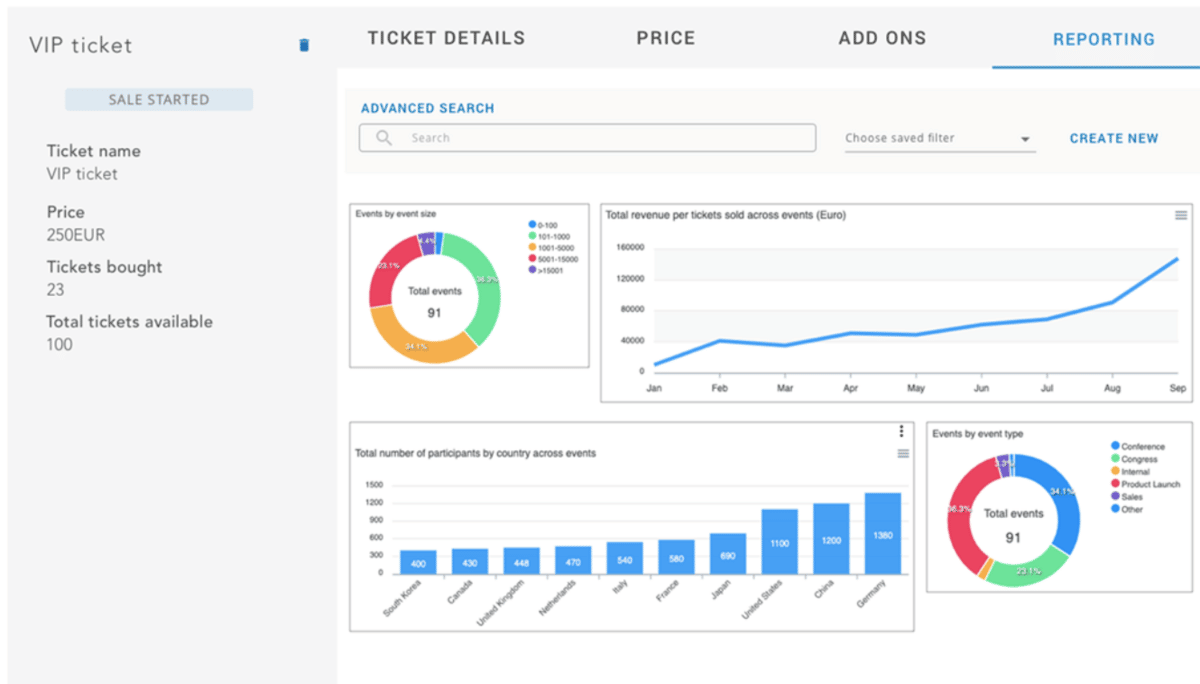
Source: Azavista
Lastly, many event registration platforms, like Regpack, offer other tools you might need to run an event, such as email automation, payments, communication tools, and a survey function.
This can be a huge advantage as having all your essential tools in one place means you won’t have to spend so much time switching between software platforms to do your job.
Enables Pre-Event Interaction
What better way to ensure your registrants actually attend your event than to interact with them beforehand?
Even just a few informational emails will get the attendee excited about the event and build your brand’s relationship with them.
The problem is that some event organizers might be crunched for time and say that communicating with their registrants is just too much to add to their plate.
Fortunately, event technology can partially or entirely automate this pre-event engagement.
Email marketing tools allow organizers to create email sequences that are automatically initiated when a registrant submits their registration form.
Some event management software also has this feature.
Through a series of emails, sent automatically at a frequency set by the user, businesses can hype up the event, send event reminders, offer discounts, and share teasers to make the registrants even more excited to attend.
And through social media platforms, they can host giveaways for VIP tickets or share promotional videos, tweets, and pictures.
Here’s an example of one of these event giveaways on social Instagram:

Source: Social Media Examiner
A specific type of content that works particularly well for building hype is the speaker promotion video, where one of your well-known speakers gives a preview of what they’ll be teaching the audience during the event.
Furthermore, many event technologies come with mobile apps, through which event planners can communicate with their attendees.
And 62% of event planners say that this ability to message guests is the number one benefit of mobile event apps.
As you can see in the example below, the event organizer is keeping the attendee informed with reminders, agendas, and other useful information.
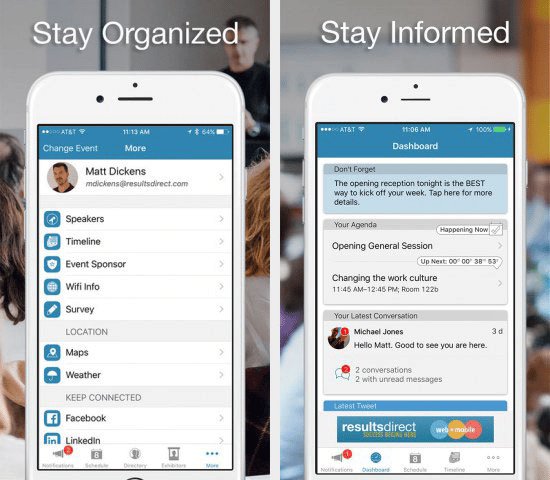
Source: orgsource.com
Connectivity between the host and attendee dramatically increases the attendee experience.
For instance, if there was a change to the event schedule, or if a speaker canceled, the event organizer can easily update their attendees with a mass message.
This touches on another important purpose of pre-event communication.
It’s not just for building hype. It’s also for informing your attendees and ensuring they have all the information they need to get the most out of the event.
If there’s a chance of rain, a message reminding your attendees to pack a raincoat would be much appreciated.
Similarly, if a key speaker was forced to cancel their appearance, your attendees would appreciate the honest update before showing up.
In sum, event management software, equipped with integration capabilities and many of its own communication tools, is another powerful way to connect with your attendees and build relationships.
Increases Audience Engagement
One of the best ways to improve your attendees’ experience is by making them feel included in the goings-on at the event.
An engaged audience will feel more connected to your brand and the other attendees, which will have numerous benefits in the long run.
Event technology offers you many ways to facilitate interactions and create an engaging environment for your guests.
Below are just some of the ways you can use event tech to increase audience engagement:
| Event gamification | Encourage some sort of activity, like networking, at your event by making a game out of it. For example, Real Property Management used EventMobi’s app to enforce the rules of the game and keep track of people’s networking numbers. Users could also check the leaderboard. |
| Interactive polls | Throughout the event, pose live polls to your audience via a mobile app. This is a great way to get them to interact with a speaker. |
| Live response systems | These allow attendees to ask questions to speakers and hosts via an app or social media tool. Event MB found that live response tools can lead to an 80-90% increase in repeat attendance. |
| Virtual reality | VR tech can enable people to attend events virtually but still feel like they’re physically present. Check out Zoho’s article to learn more about what VR means for the event industry. |
It’s good to offer a variety of ways to get involved because different attendees will have different behavior types, as shown in the table below:
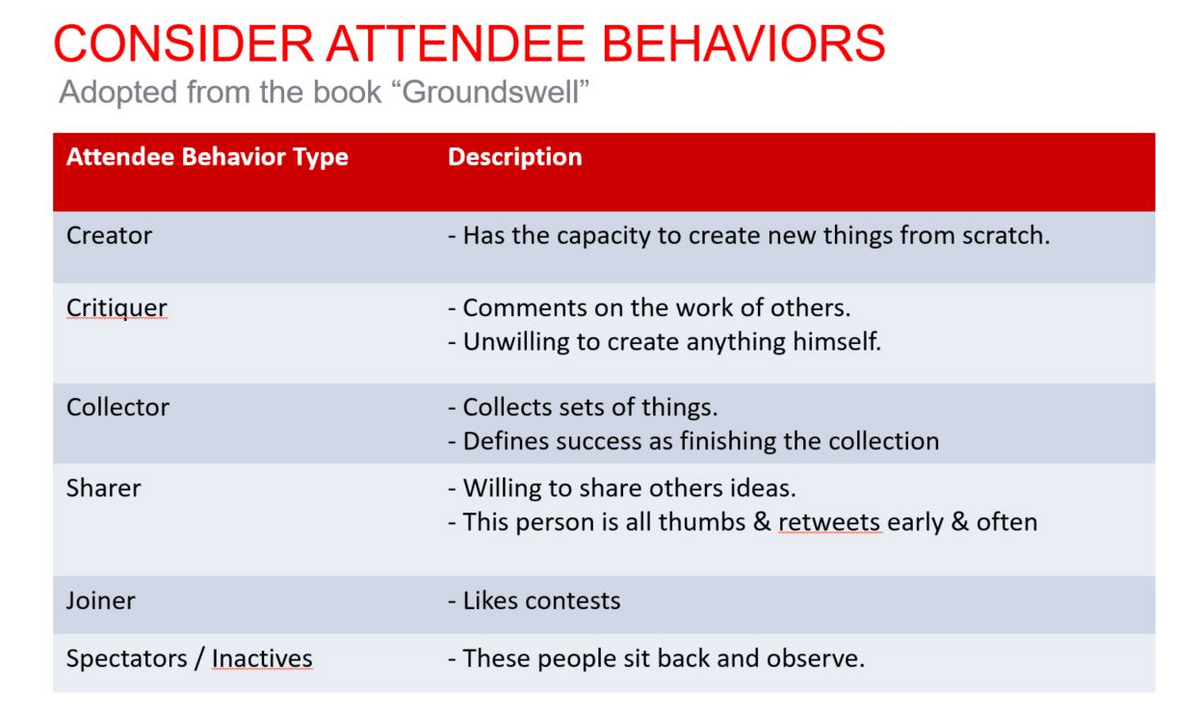
Source: SocialPoint
So, while a joiner type would enjoy some friendly competition, a critiquer would prefer live polls that allow them to express their thoughts, positive or negative, in a public setting.
In sum, being included in an event lifts the attendee from spectator to active participant, which enhances the experience and increases brand loyalty.
Makes the Day of the Event Stress-Free
The big day of the event can be incredibly stressful for even the most zen event organizer.
The many months of planning come down to this. You want to show your attendees an amazing time. Unfortunately, there are often unexpected issues that pop up.
But event technology is there to help. It can aid in making the day of the event stress-free for organizers by handling the back-end tasks.
For example, the tech can take over processing registration and name tags.
And, mid-event, when you need to look someone up, it’s a whole lot easier to find an attendee’s information by searching their name in an online database than by flipping through a stack of papers.
With event technology, organizers can instead focus on the parts of the event that require their skill or a personal touch, from troubleshooting a sound system issue to greeting attendees and making them feel welcomed and comfortable.
Additionally, most mobile event apps come with communication tools that enable organizers to easily collaborate during the event.
With so much to think about on event day, it’s a relief to be able to hand some off to a smart software system.
Provides Valuable Data
Event technology such as event management and registration software and data analytics tools helps you gather valuable event data and analyze it to uncover insights that are useful for organizing future events.
Software typically provides users with features like pre-built and custom reports and real-time analytics that help them track essential event metrics like top-performing sessions or live polling response rate, which can both serve as indicators of the attendees’ levels of engagement.
Many businesses also track attendance rate and use that as a measure of the success of their pre-event attendee interaction strategy, like an email campaign for those who registered:
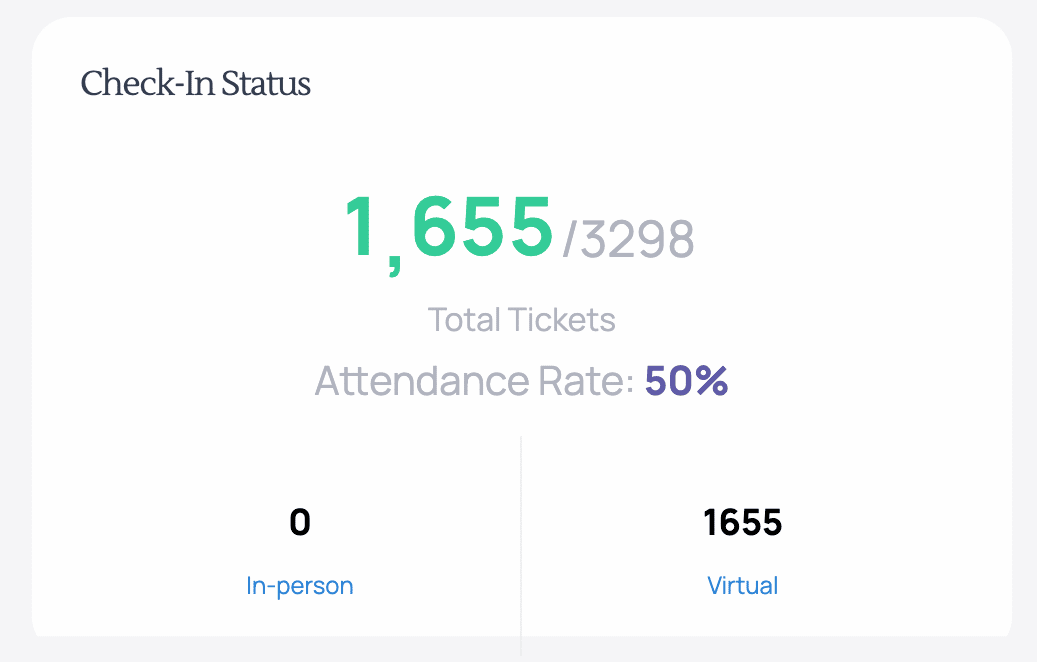
Source: Bizzabo
But data analytics features don’t just help you assess your last event’s performance and find areas for improvement.
Data can also be helpful when making critical decisions about marketing and advertising for future events, as you can use information you’ve collected from past customers to pinpoint your target audience.
For example, in most event management platforms with centralized databases, you can filter your data by different fields.
Through this process, you might find that a significant majority of your attendees fall between the 30-40 age range and put “freelancer or contractor” as their job title on your web form. In that case, it’s a good idea to target people within those demographics for next year’s event.
You could also do something like filter your registrants by ticket type to see which ticket types are most appealing to prospective attendees.
Further, one of the coolest aspects of most event management software is the ability to pick which metrics you want tracked before the event takes place so that after your event you barely have to do any analysis—the system has the numbers there for you already.
It’s like having a team of analysts working for you.
And, though it’s still no cut-and-dry matter, all you need to do is use your experience as an event organizer to figure out what to do with that intel.
Enables Post-Event Success
The event process is not over when everybody goes home. There is still a lot of work to be done.
Event organizers have to take steps to evaluate their performance, follow up with attendees, and collect material they can use to market future events.
Event tech helps you accomplish all this.
For instance, many event management platforms empower you to collect feedback from customers via automated surveys or apps, which you can use to find any event shortcomings you can remedy next time around to improve.
For example, here’s a snapshot of a post-event question from a survey created with the tool GetFeedback:
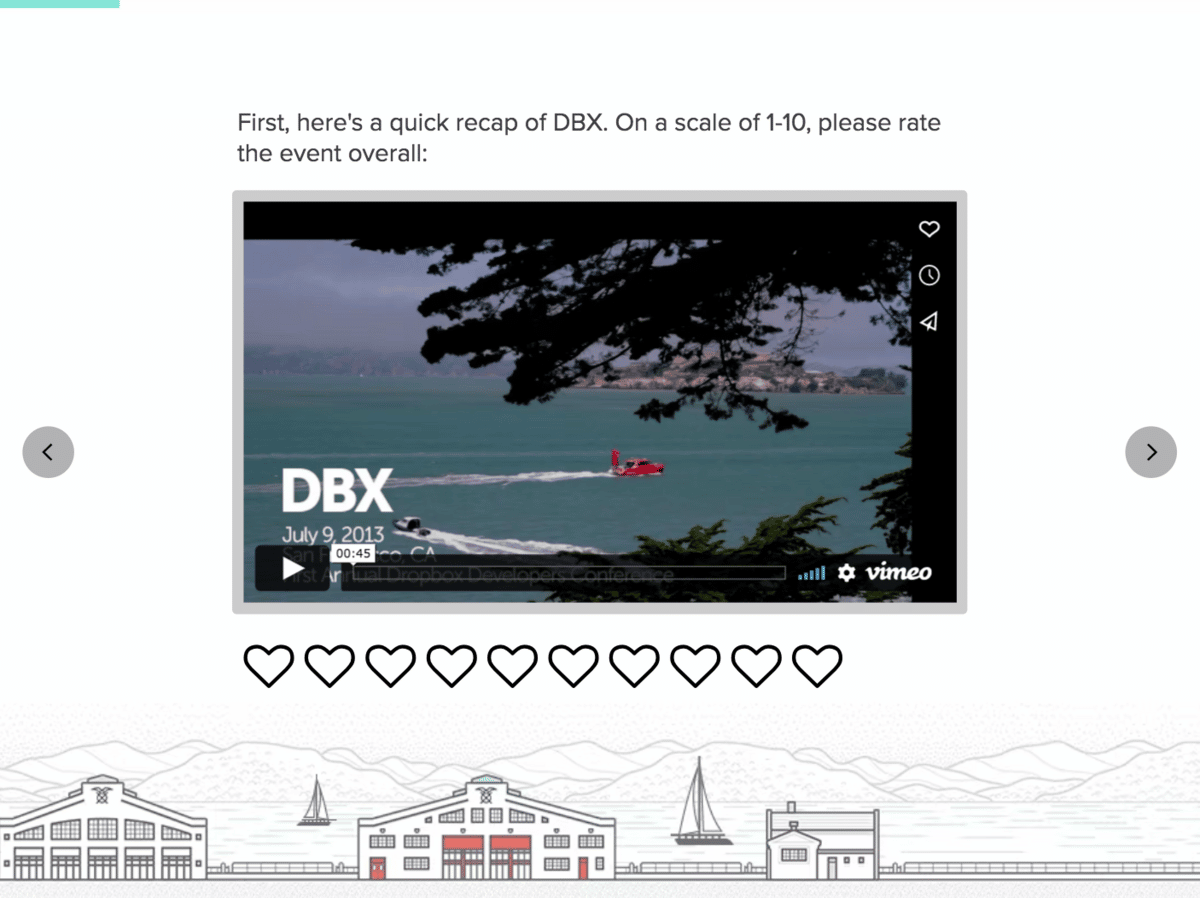
Source: GetFeedback
Because event management software also allows you to track critical customer data like email addresses or attendance status, you can quickly reach out to the right attendees to ask for testimonials.
You can later place those testimonials on your future event pages to market the event.
Furthermore, many event software platforms come with automated emails.
Those allow you to create and send emails to attendees thanking them for attending the event and providing them with post-event access to recorded sessions, often facilitated by webinar software or cameras for in-person ones.
Below is an example of what we mean:
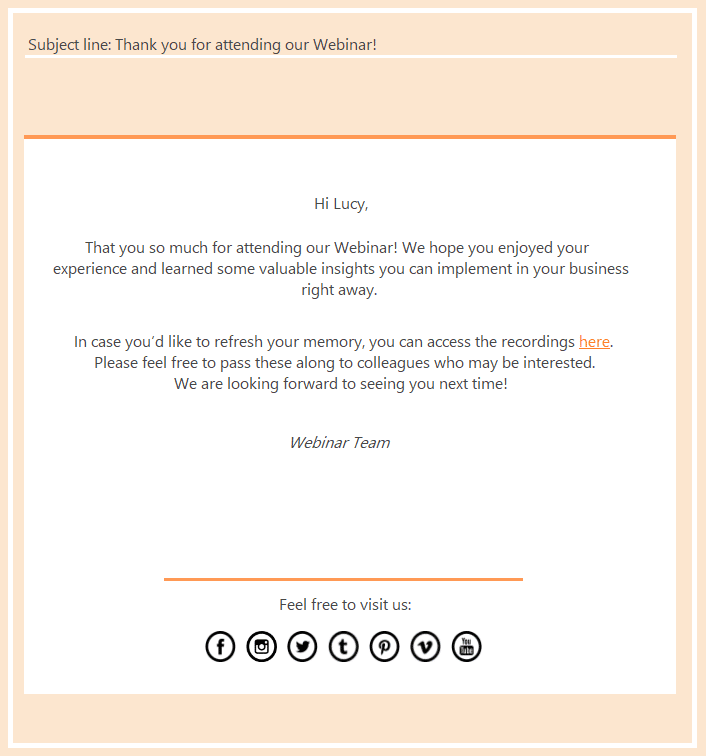
Source: LiveAgent
You can also use these recordings to reach new audiences.
By sharing on-demand videos of the event’s sessions across social media or with your email list even more people can find out about the event and make sure they attend next time around.
Conclusion
Event tech ranges from webinar software and marketing tools to event management and registration software platforms.
Because an event planner’s job requires them to be a sort of jack of many trades, they often need all the help they can get.
With the right tech stack, your business can save time, improve communication with your attendees, reduce stress on event day, and, most importantly, give your attendees an experience they won’t soon forget.


















